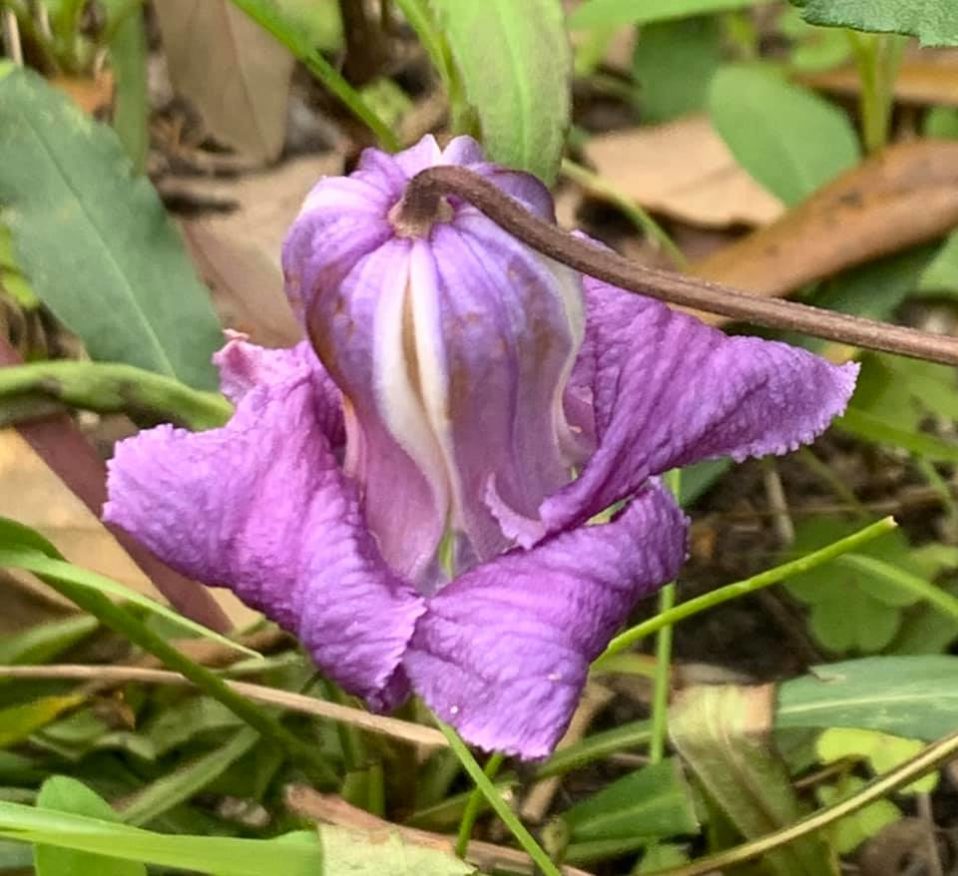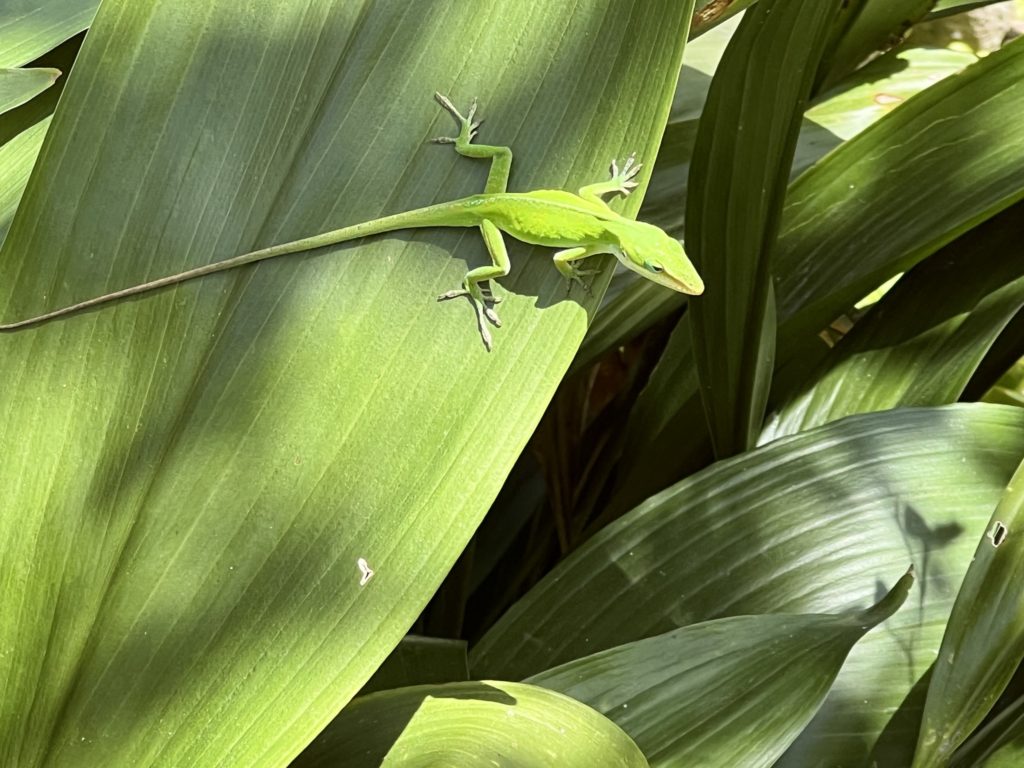
Eric Duran
Head Naturalist
Twice a year, once in the Spring and once in the Fall, we try to count all of the living wild species of plants, animals, slime molds, and fungi that we can find in Russ Pitman Park, where the Nature Center is located.
This counting of species is referred to as a “BioBlitz”. It’s an important part of understanding the life at the Nature Center, and how it may be changing over time. We want to be able to answer questions about population trends, introduced non-native species, and general biodiversity.
Our staff naturalists conduct this count, along with volunteer naturalists and biologists. For many institutions, a Bio-blitz is just one day, but we have a limited staff and relatively small volunteer corps, so our bio-blitzes usually last for about 2 weeks. This month, because of busy schedules and even fewer available volunteers, we decided to make the Fall BioBlitz last for the entire month of October. We may just move to having both our Spring and Fall BioBlitzes last a full month in the future.
As a practice, we like to enter much of our observations into E-Bird and iNaturalist, so that our data is accessible to biologists around the world and through time, going forward. That way, our local data can become part of big picture scientific data.
This was a really successful Fall BioBlitz!
This year, we counted 359 total species, which was comparable to last year’s Fall Bio-blitz count of 361. This number is still more than 2020 and 2019. The relatively cooler weather this year, and lack of rain before and during the BioBlitz probably negatively impacted the species count.
As with most of the counts we do, we found a few new species for the park (at least as far as we know from records). Although the Wandering Glider is the most widespread dragonfly in the world, we had yet to add it to one of our BioBlitz lists. We were also finally able to add Black Saddlebags, another common dragonfly, as well as the common fall butterfly, the Sleepy Orange. The Fireflag Plume Moth was a totally new species for the park, as were the Black-shouldered Drone Fly, the Australian Cockroach, the Flat-faced Longhorn Beetle, and the Trainwrecker mushroom.
It usually takes 2-4 weeks to get all of the species, that we photographed, identified, so that we can compile an accurate count. As far as we know at this, time, we’ve IDed everything we can, and we are ready to present to you the final version of the Fall 2022 Bio-blitz for the Nature Discovery Center in Russ Pitman Park!
If you have any questions, feel free to email me at eduran@naturediscoverycenter.org.
Thank you!
All photos by Eric Duran. CC BY-SA – Some rights reserved.
*******************************************************************
RUSS PITMAN PARK FALL 2022 BIOBLITZ (October – 2022)
ALL SPECIES: (360)
ANIMALS: (183)
VERTEBRATES: (59)
INVERTEBRATES: (124)
FUNGI: (25)
SLIME MOLDS: (2)
PLANTS: (150)
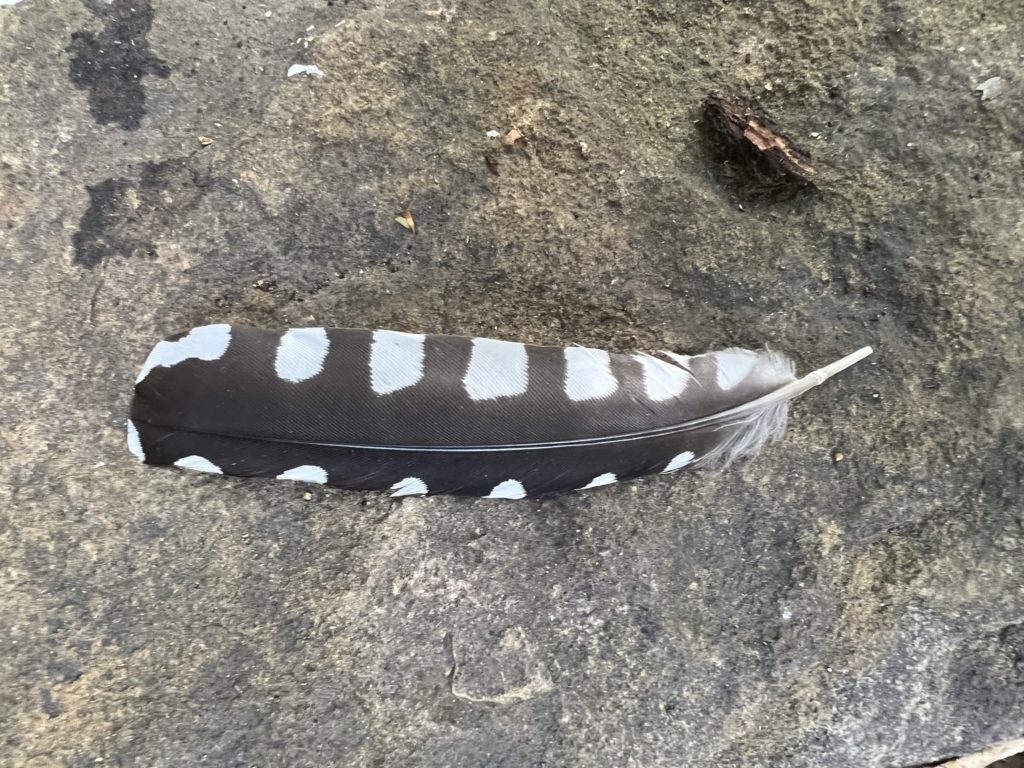
Mammals: (4)
Gray Squirrel – Sciurus carolinensis
Fox Squirrel – Sciurus niger
Raccoon – Procyon lotor
Roof Rat – Rattus rattus
Birds: (44)
Downy Woodpecker – Picoides pubescens
Red-bellied Woodpecker – Melanerpes carolinus
Yellow-bellied Sapsucker – Sphyrapicus varius
Cooper’s Hawk – Accipiter cooperii
Red-tailed Hawk – Buteo jamaicensis
Broad-winged Hawk – Buteo platypterus
Turkey Vulture – Cathartes aura
Black Vulture – Coragyps atratus
Eastern Screech Owl – Megascops asio
Ruby-throated Hummingbird – Archilochus colibris
Rufous Hummingbird – Selasphorus rufus
Chimney Swift – Chaetura pelagica
White-winged Dove – Zenaida asiatica
Carolina Wren – Thryothorus ludovicianus
Northern Cardinal – Cardinalis cardinalis
Indigo Bunting – Passerina cyanea
Summer Tanager – Piranga rubra
American Crow – Corvus brachyrhynchos
Blue Jay – Cyanocitta cristata
Carolina Chickadee – Poecile carolinensis
Tufted Titmouse – Baeolophus bicolor
American Robin – Turdus migratorius
Hermit Thrush – Catharus guttatus
Blue-headed Vireo – Vireo solitarius
Philadelphia Vireo – V. philadelphicus
White-eyed Vireo – V. griseus
Black & White Warbler – Mniotilta varia
Orange-crowned Warbler – Vermivora celata
Tennessee Warbler – Leiothlypis peregrina
Nashville Warbler – L. ruficapilla
Yellow-throated Warbler – Setophaga dominica
American Redstart – Setophaga ruticilla
Black-throated Green Warbler – S. virens
Wilson’s Warbler – Cardellina pusilla
Yellow-rumped Warbler – Setophaga coronate
Pine Warbler – S. pinus
Magnolia Warbler – S.magnolia
Northern Mockingbird – Mimus polyglottus
Eastern Wood-Peewee – Contopus virens
Eastern Phoebe – Sayornis phoebe
Great Crested Flycatcher – Myiarchus crinitus
Blue-gray Gnatcatcher – Polioptila caerulea
Ruby-crowned Kinglet – Regulus calendula
Golden-crowned Kinglet – R. satrapa
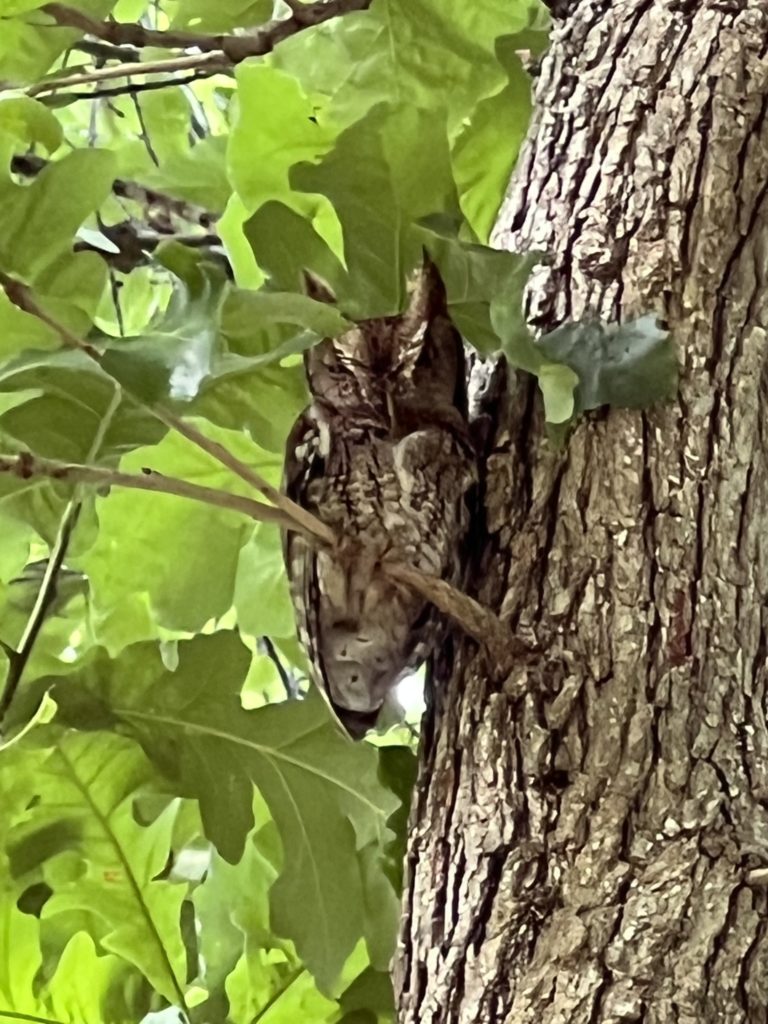
Reptiles: (8)
Three-toed Box Turtle – Terrapene Carolina
Red-eared Slider – Trachemys scripta elegans
Green Anole – Anolis carolinensis
Cuban Brown Anole – Anolis sagrei
Ground Skink – Scincella lateralis
Mediterranean Gecko – Hemidactylus turcicus
Rough Earth Snake – Haldea striulata
Brahminy Blind Snake – Indotyphlops braminus
Amphibians: (1)
Gulf Coast Toad – Incilius nebulifer
Bony Fish: (2)
Mosquitofish – Gambusia affinis
Tilapia – Tilapia zillii (introduced)
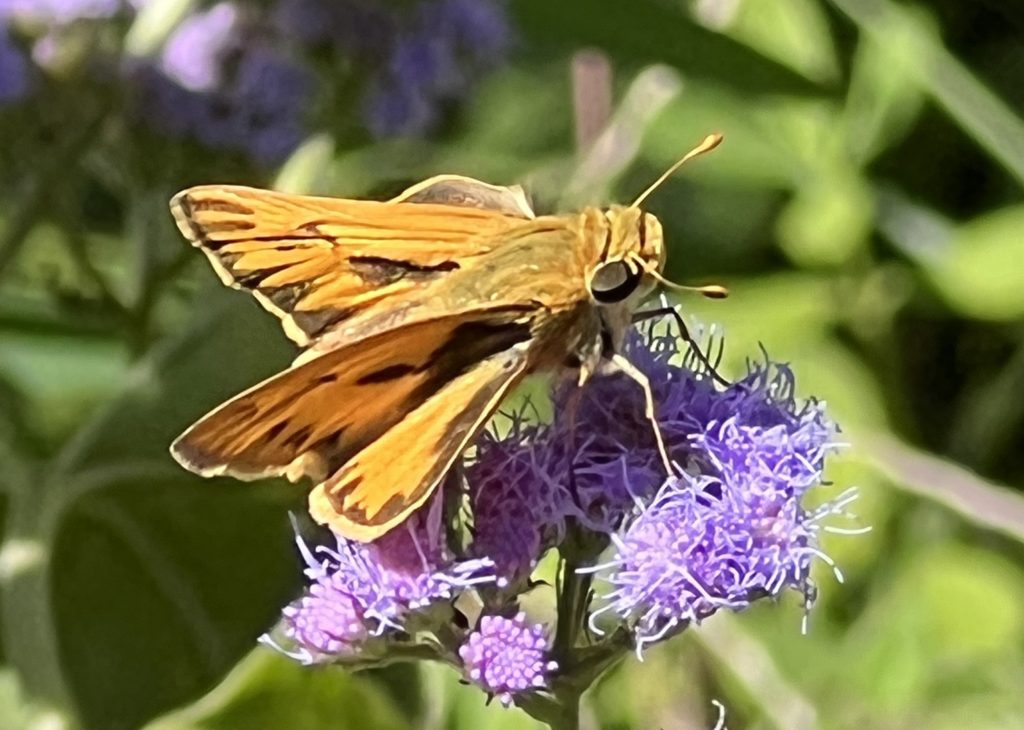
INVERTEBRATES (Non-insects): (18)
Mollusks: (3)
Asian Tramp Snail – Bradybaena similaris
Globular Drop – Oligyra orbiculata
Flatcoil Snail – Polygyra sp.
Segmented Worms: (1)
Common Earthworm – Lumbricus terrestris
Arachnids: (12)
Wolf Spider – Tigrosa georgicola
Wolf spider – Tigrosa sp.
House Orbweaver – Metazygia zilloides
Common Orbweaver – Mangora sp.
Common House Spider – Parasteatoda tepidariorum
Spinybacked Orbweaver – Gasteracantha cancriformis
South American Hacklemesh Spider – Metaltella simony
Long-jawed Orbweaver – Tetragnatha sp.
Yellow Garden Spider – Argiope aurantia
Orchard Orbweaver – Leucage sp.
Funnel Weaver – Barronopsis sp.
Brown Widow – Lactrodectus geometricus
Crustaceans: (2)
Comm. Striped Woodlouse – Philoscia muscorum
Common Pillbug – Armadillidium vulgare
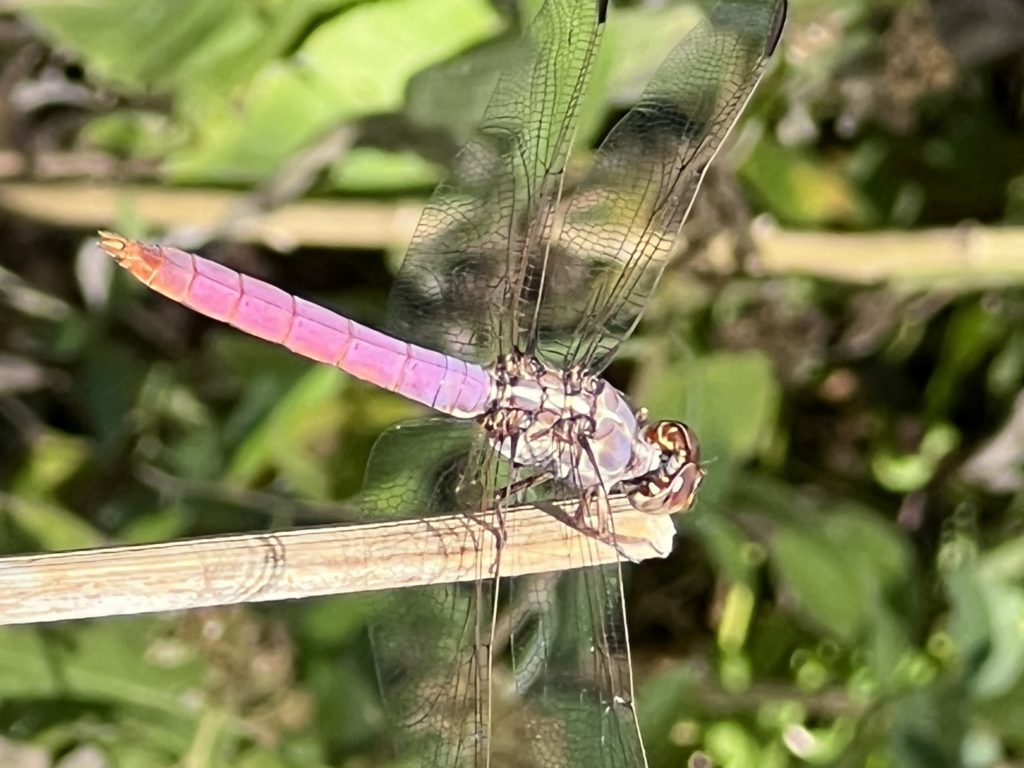
INSECTS/Hexapods: (106)
Dragonflies and Damselflies: (9)
Roseate Skimmer – Orthemis ferruginea
Great Blue Skimmer – Libellula vibrans
Wandering Glider – Pantala flavascens
Neon Skimmer – Libellula corceipennis
Blue Dasher – Pachydiplax longipennis
Slough Amberwing – Perithemis domitia
Black Saddlebags – Tramea lacerata
Band-winged Dragonlet – Erythrodiplax umbrata
Citrine Forktail – Ischnura hastata
Caddisflies: (1)
Net-spinning Caddisfly – Hydropsychinae
Butterflies and Moths: (33)
Monarch – Danaus plexipus
Common Buckeye – Junonia coenia
Tawny Emperor – Asterocampa clyton
Spicebush Swallowtail – Papilio troilus
Eastern Giant Swallowtail – Papilio cresphontes
American Black Swallowtail – Papilio polyxenes
Gulf Fritillary – Agraulis vanilla
Horace’s Duskywing – Erynnis horatius
Clouded Skipper – Lerema accius
Ocola Skipper – Panoquina ocola
Fiery Skipper – Hylephila phyleus
Dorantes Longtail – Thorybes dorantes
Cloudless Sulphur – Phoebis sennae
Little Yellow – Pyrisitia lisa
Sleepy Orange – Abaeis nicippe
Texan Crescent – Anthanassa texana
Pearl Crescent – Phyciodes tharos
Gray Hairstreak – Strymon melinus
Abbot’s Bagworm Moth – Oiketicus abbotii
Southern Flannel Moth – Megalopyge opercularis
Indian Meal Moth – Plodia interpunctella
Feather-edged Petrophila – Petrophila fulicalis
Curve-horned Moth – Gelechioidea
Dusky Herpetogramma Moth – Herpetogramma phaeopteralis
Pannaria Wave – Leptostales pannaria
Assembly Moth – Samea catellalis
Genista Broom Moth – Uresiphita reversalis
Hawaiian Beet Webworm Moth – Spoladea recurvalis
Spotted Beet Webworm Moth – Hymenia perspectalis
Greater Wax Moth – Galleria mellonella
Celery Leaftier Moth – Udea rubigalis
Green Cloverworm Moth – Hypena scabra
Moonseed Moth – Plusiodonta compressipalpis
Angle Moth – Rindgea nigricomma
Wedgeling Moth – Galgula partita
Lesser Cornstalk Borer Moth – Elasmopalpus lignosella
Pecan Borer Moth – Gretchena bolliana
Cobbler Moth – Condica sutor
Soybean Looper Moth – Chrysodeixis includes
Wainscot Green Veneer – Eoreuma densellus
Erebinae (caterpillar)
Unicorn Prominent – Coelodasys unicornis
White-speck Moth – Mythimna unipunctata
Dot-lined Angle – Pasamatodes abydata
Eggplant Leafroller Moth – Lineodes integra
Green Cutworm Moth – Anicla infecta
Black-shaded Platynota Moth – Platynota flavedana
American Idea Moth – Idea americalis
Milky Argyria Moth – Argyria lacteella
Fire-flag Plume Moth – Sphenarches anisodactylus
Bicolored Ecdytolopha Moth – Ecdytolopha mana
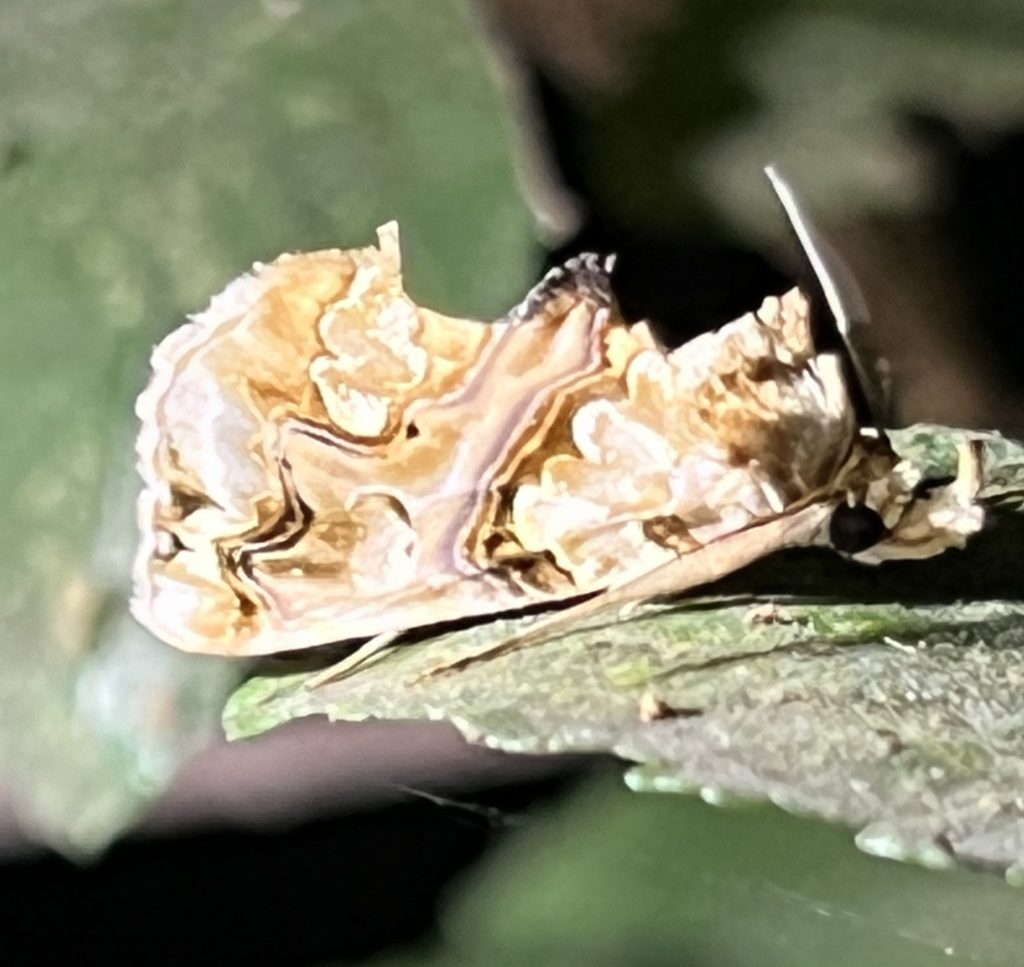
Flies: (14)
Goldenrod Gall Fly – Erosta solidaginis
Hackberry Aciculate Gall Midge – Celticecis aciculate
Hackberry Globular Leaf Gall Midge – Celticecis globosa
Long-legged fly – Condylostylus sp.
Oriental Latrine Fly – Chrysomya megacephala
Leaf-miner Fly – family Agromyzidae
Dusky-winged Hoverfly – Ocyptamus fuscipennis
Black-shouldered Drone Fly – Eristalis dimidiata
Calligrapher Fly – Toxomerus sp.
Narrow-headed Marsh Fly – Heliophilus fasciatus
Non-biting Midge – Chironomus sp.
Common Flesh Fly – Sarcophaga sp.
Crane Fly – Tipuloidaea
Beefly – Bombyliidae
Bees, Wasps, Sawflies, Ants: (23)
Eastern Carpenter Bee – Xylocopa virginica
Southern Carpenter Bee – Xylocopa micans
Horsefly-like Carpenter Bee – Xylocopa tabaniformis
Western Honeybee – Apis mellifera
Leafcutter Bee – Megachile sp.
Carpenter Mimic Leafcutter Bee – Megachile xylocopoides
American Bumblebee – Bombus pensylvanicus
Small black sweat bee – Halictidae
Metallic Epauletted Sweat Bee – Augochloropsis metallica
Carpenter Ant – Camponotus sp. – subgenus Myrmentoma
Black Crazy Ant – Paratrechina longicornis
Graceful Twig Ant – Pseudomyrmex gracilis
Red Imported Fire Ant – Solenopsis invicta
Metric Paper Wasp – Polistes metricus
Southern Live Oak Stem Gall Wasp – Callirhytis quercusbatatoides
Braconid Wasp – Atanycolus sp.
Red-marked Pachodynerus – Pachodynerus erynnis
Yellow-legged Mud Dauber – Sceliphron caementarium
Spider Wasp – Pompilini
Feather-legged Scoliid Wasp – Dielis plumipes
Gold-marked Thread-wasted Wasp – Eremnophila aureonotata
Blue-eyed Ensign Wasp – Evania appendigaster
Weevil Wasp – Cerceris sp.
Beetles: (7)
Asian Ladybird Beetle – Harmonia axyridis
Ground Beetle – Notiobia terminata
June Beetle – Phyllophaga sp.
Ground Beetle – Agonum sp.
Drugstore Beetle – Stegiobium paniceum
Flat-faced Longhorn Beetle – Ataxia crypta
Red-shouldered Bostrichid – Xylobiops basilaris
True Bugs: (8)
Hackberry Petiole Gall Psyllid – Pachypsylla venusta
Scissor-grinder Cicada – Neotibicen pruinosi
Giant Leaf-footed Bug – Acanthocephala declivis
Eastern Leaf-footed Bug – Leptoglossus phyllopus
Ambush Bug – Phymata fasciata
Brokenback Bug – Taylorilygus apicalis
Jewel Bug – Orsilochides stictica
Planthopper – Cyarda sp.
Coppery Leafhopper – Jikradia olitoria
Cockroaches: (5)
Suriname Roach – Pycnoscelus surinamensis
American Cockroach – Periplaneta americana
Asian Cockroach – Blatella asahinai
Smoky Brown Cockroach – Periplaneta fuliginosa
Australian Cockroach – Periplaneta australasiae
Termites: (1)
Eastern Subterranean Termite – Reticulitermes flavipes
Earwigs: (1)
Yellow-legged earwig – Euborellia arcanum
Lacewings: (3)
Brown Lacewing – Micromus subanticus
Brown Lacewing – Hemerobiinae
Green Lacewing – Chrysopa quadripunctata
SLIME MOLD: (2)
Dog Vomit Slime Mold – Fuligo septica
Chocolate Tube Slime – Stemonitis splendens
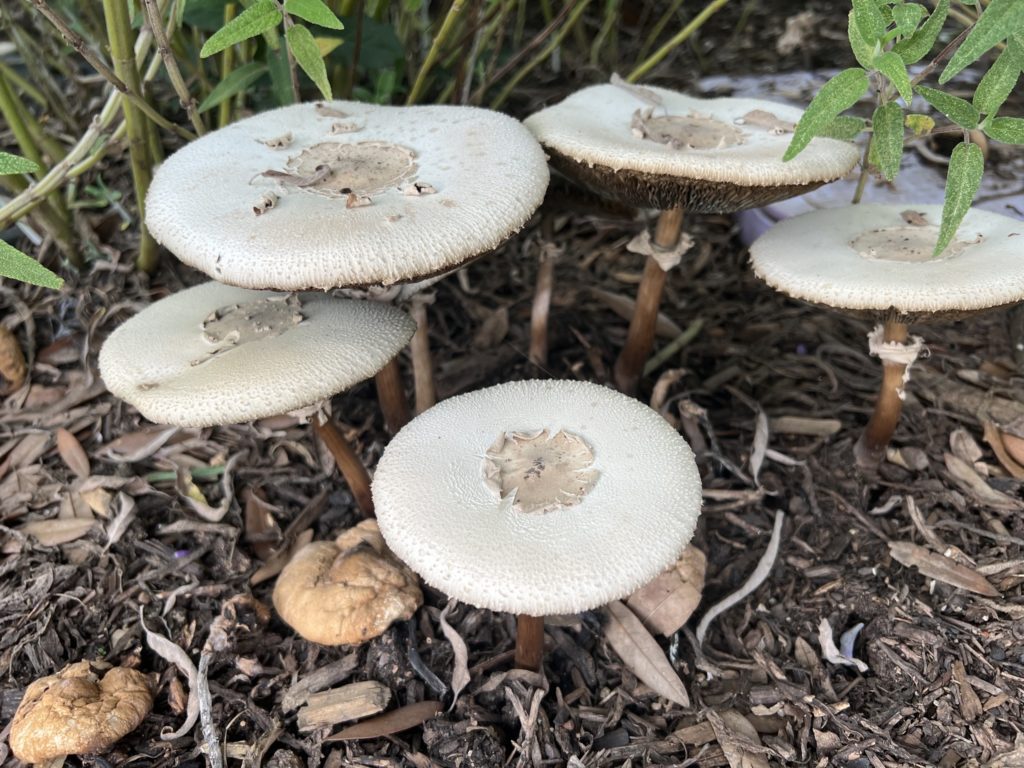
FUNGI: (25)
Hairy Hexagonia – Hexagonia hydnoides
False Turkey Tail – Stereum ostrea
Southern Clamshell – Fomes fasciatus
Crowded Parchment Fungus – Stereum complicatum
Bracket Fungus – Ganoderma sessile
Bracket Fungus – Trametes lactinea
Oak Bracket – Pseudoinonotus dryadeus
Turkey Tail Fungus – Trametes versicolor
Mustard Yellow Polypore – Fuscoparia gilva
Hypoxylon Canker – Biscogniauxia atropunctata
Common Tarcrust – Diatrype stigma
Ceramic Parchment fungus – Xylobolus frustulatus
Firerug Inkcap – Coprinellus sect. Disseminati
Splitgill Mushroom – Schizophyllum commune
Honeycomb Bracket fungus – Favolus brasiliensis
Green-spored Parasol – Chlorophyllum molybdites
Wood Ear Fungus – Auricularia sp.
Deer Mushroom – Pluteus cervinus
Trainwrecker – Neolentinus lepideus
Pore lichen – Pertusaria sp.
Graffiti Lichen – Graphis sp.
Common Greenshield Lichen – Flavoparmelia caperata
Eastern Speckled Shield Lichen – Punctelia bolliana
Whitewash Lichen – Phlyctis argena
Cartilage Lichen – Ramalina complanata
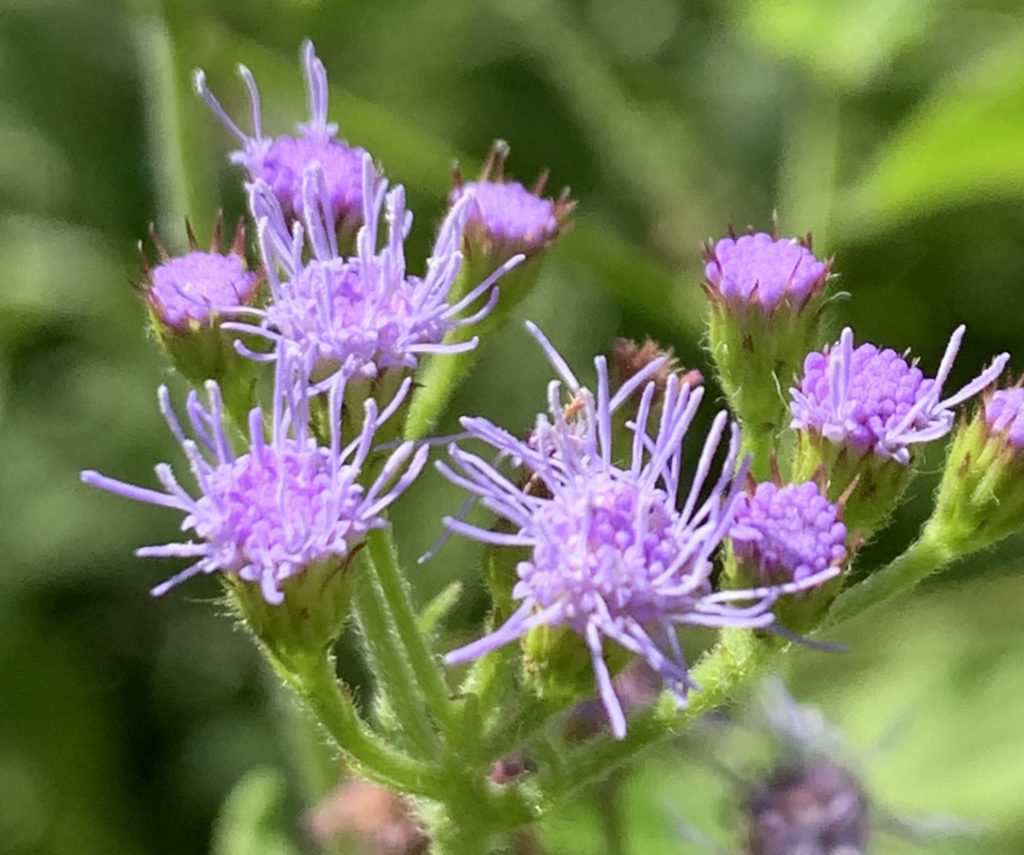
PLANTS: (150)
There are of course way more than ___ plants in Russ Pitman Park.
The Nature Discovery Center, however, already has a rather voluminous and exhaustive plant list for the park. Thus, the naturalists who participated in the first Bio-blitz did not attempt to document all or even most of the plants in the park. Participants simply noted plants they found interesting, observed fruiting or blooming, or thought may not already be on the official park list of plants.
During future Bio-blitzes, we will invite plant specialists to help us survey more systematically, for a more thorough accounting of plants present in the park.
Mosses: (1)
Unidentified moss sp.
Ferns: (3)
Resurrection Fern – Pleopeltis michauxiana
Japanese Climbing Fern – Lygodium japonicum
Southern Wood Fern – Dryopteris ludoviciana
Palms: (2)
Dwarf Palmetto – Sabal minor
Mexican Fan Palm – Washingtonia robusta
Grasses/Sedges/Rushes: (14)
Indiangrass – Sorghastrum nutans
Switch Grass – Panicum virgatum
Gulf Muhly – Muhlenbergia capillaris
Eastern Gamagrass – Tripsacum dactyloides
Basketgrass – Oplismenus hirtellus
Wood Oats (Inland Sea Oats) – Chasmanthium latifolium
Southeastern Wildrye – Elymus glabriflorus
Bermuda Grass – Cynodon dactylon
Big Bluestem – Andropogon gerardi
Hairy Crabgrass – Digitaria sanguinalis
Umbrella Papyrus – Cyperus involucratus
Cherokee Sedge – Carex cherokeensis
True sedge – Carex sp.
Deep-rooted Sedge – Cyperus enterianus
Broadleaf Plants: (130)
Mexican Plum – Prunus mexicanus
Boxelder Maple – Acer negundo
Red Maple – Acer rubrum
Southern Sugar Maple – Acer floridanum
American Sycamore – Platanus occidentalis
American Sweetgum – Liquidambar occidentalis
Chinese Privet – Ligustrum sinense
Tree Privet – Ligustrum lucidum
Ornamental Pear – Pyrus sp.
Black Willow – Salix nigra
Gum Bumelia – Sideroxylon langunosum
River Birch – Betula nigra
Sweetbay Magnolia – Magnolia virginiana
Southern Magnolia – Magnolia grandiflora
Sugar Hackberry – Celtis laevigata
Green Ash – Fraxinus pennsylvanica
Red Mulberry – Morus rubra
Chinese Mulberry – Morus alba
Shummard Red Oak – Quercus shumardii
Southern Live Oak – Quercus virginiana
Loquat-leaf Oak – Quercus rysophylla
Bur Oak – Quercus macrocarpa
Swamp Chestnut Oak – Quercus michauxii
Live Oak – Quercus virginiana
Willow Oak – Quercus phellos
Water Oak – Quercus nigra
Bald Cypress – Taxodium distichum
Loblolly Pine – Pinus taeda
Spruce Pine – Pinus glabra
Roughleaf Dogwood – Cornus drummondii
Eastern Redbud – Cercis canadensis
Carolina Laurelcherry – Prunus caronliniana
American Hornbeam – Carpinus caroliniana
Mexican Buckeye – Ungnadia speciosa
Osage Orange – Maclura pomifera
Orchid Tree – Bauhinia variegata
Shining Sumac – Rhus copallinum
Pecan – Carya illinoinensis
American Elm – Ulmus americana
Cedar Elm – Ulmus crassifolia
Northern Catalpa – Catalpa speciose
Chinese Raintree – Koelrueteria elegans
American Basswood – Tilia Americana
Camphor Tree – Cinnamomum camphora
Coralberry – Symphoricarpos orbiculatus
False Indigo – Amorpha fruticosa
Senna sp.
Parsley Hawthorn – Crataegus marshallii
Yaupon Holly – Ilex vomitoria
Chinese Holly – Ilex cornuta
Possumhaw Holly – Ilex decidua
American Black Elderberry – Sambucus canadensis
Southern Arrowwood – Viburnum dentatum
Buttonbush – Cephalanthus occidentalis
American Beautyberry – Callicarpa americana
Heavenly Bamboo – Nandina domestica
Common Lantana – Lantana camara
Texas Lantana – Lantana x urticoides
Groundsel Tree – Baccharis halimifolia
Redbay – Persea borbonia
Straggler Daisy – Calyptocarpus vialis
Texas Frogfruit – Phyla nodiflora
Yard Aster – Symphotrichum divaricatum
Panicled Aster – Symphotrichum lanceolatum
False Daisy – Eclipta prostrata
Blue Mistflower – Conoclinium coelestinum
Tall Goldenrod – Solidago altissima
Seaside Goldenrod – Solidago sempervirens
Giant Goldenrod – Solidago canadensis
Narrowleaf Sunflower – Helianthus angustifolius
Camphorweed – Pluchea camphorata
Opposite-leaf Spotflower – Acmella repens
Spiny Chloracantha – Chloracantha spinosa
Cuban Jute – Sida rhombifolia
Illinois Bundleflower – Desmanthus illinoensis
Chamberbitter – Phyllanthus urinaria
Leafy Elephant’s-foot – Elephantopus carolinianus
Frostweed – Verbesina virginica
Missouri Ironweed – Vernonia missurica
Mexican Primrose-willow – Ludwigia octovalvis
Three-seeded Mercury – Acalypha sp.
Lizard’s Tail – Saururus cernuus
Obedient Plant – Physostegia virginiana
Brazos Penstemon – Penstemon tenuis
Hairy Crabweed – Fatoua villosa
Pickerelweed – Pontederia cordata
Rattlesnake Master – Eryngium yuccifolium
Cast Iron Plant – Aspidistra elatior
Monkey grass – Liriope sp.
Mexican Shrimp Plant – Justicia brandegeeana
Mexican Ruellia – Ruellia simplex
Wild Petunia – Ruellia caerula
Wedelia – Sphagneticola calendulacea
Turk’s Cap – Malvaviscus arboreus
Whitemouth Dayflower – Commelina erecta
Scarlet Sage – Salvia coccinea
Giant Blue Sage – Salvia azurea
Ball Moss – Tillandsia recurvata
Late Boneset – Eupatorium serotinum
Eastern False Aloe – Manfreda virginica
Narrowleaf Sunflower – Helianthus angustifolius
White Clover – Trifolium repens
Alligatorweed – Alternathera philoxeroides
Swamp Criunum – Crinum sp.
Spotted Spurge – Euphorbia maculata
Painted Spurge – Euphorbia heterophylla
Mock Strawberry – Potentilla indica
Peruvian Lily – Alstroemeria aurea
Tahitian Bridalveil – Gibasis pellucida
Blue Violet – Viola sororia
Shrubby Boneset – Ageratina havanensis
Pitcher’s Leatherflower – Clematis pitcher
Swamp Leatherflower – Clematis crispa
Mugwort – Artemisia sp.
Climbing Hempvine – Mikania scandens
Tievine – Ipomoea cordatotriloba
Saltmarsh Morning-glory – Ipomoea sagittata
Mustang Grape – Vitis mustangensis
Muscadine Grape – Vitis rotundifolia
American Trumpetvine – Campsis radicans
Carolina Snailseed – Cocculus carolinus
Virginia Creeper – Parthenocissus quinquefolia
Poison Ivy – Toxicodendron redicans
Japanese Honeysuckle – Lonicera japonica
Saw Greenbriar – Smilax bona-nox
Cross Vine – Bignonia capreolata
Blackberry/Dewberry – Rubus sp.
Scarlet Creeper – Ipomoea hederifolia
Pepper Vine – Ampelopsis arborea
Catclaw Vine – Dolichandra unguis-cati


